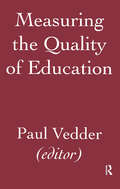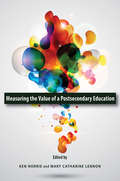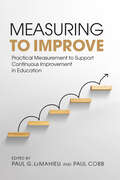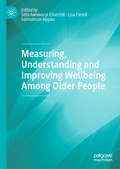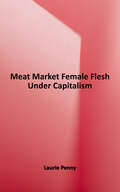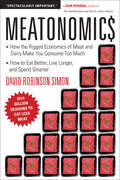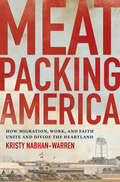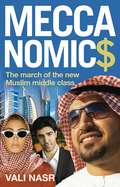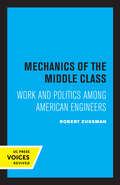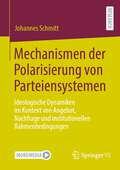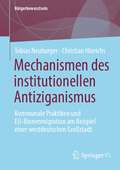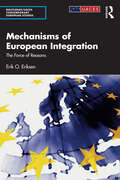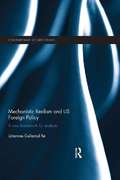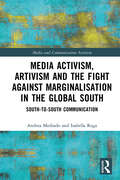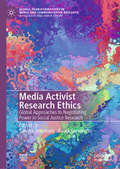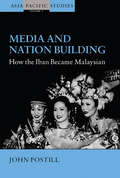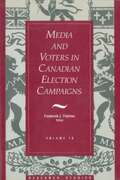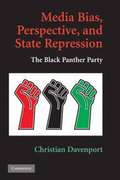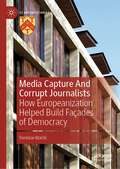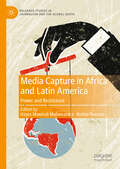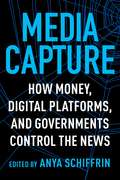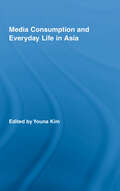- Table View
- List View
Measuring the Quality of Education
by Paul VedderThis book contains a selection of articles on measuring the quality of education from the perspective of the importance of theories on education, changing effects of education, curriculum dependent or curriculum independent measurement, product and process evaluation, and global curricula.
Measuring the Value of a Postsecondary Education
by Ken Norrie Mary Catharine LennonMeasuring the Value of a Postsecondary Education is an insightful collection of essays that respond to current and pressing questions in the field of higher education: What do we mean by "quality" of education? What do courses and programs promise to deliver, and do they succeed? What do we know about improving learning outcomes, and is reform possible? Comprised of papers presented at a conference of experts convened by the Higher Education Quality Council of Ontario in 2011, the book begins by evaluating pioneering initiatives in Europe, and follows this with reports on efforts to measure and evaluate learning outcomes. Drawing on over two decades of work by international agencies, governments, and foundations in identifying and evaluating learning outcomes in higher education, Measuring the Value of a Postsecondary Education encourages educational institutions to draw on this evidence in revising course and program offerings. Bringing together international leaders and innovators in the field, this book is an important analysis of progress in enhancing learning quality and directions for future reform. Contributors include Jeana Abromeit (Alverno College), Roger Benjamin (Council for Aid to Education), Ken Dryden (Canadian politician), Michael Gallagher (Group of Eight), Virginia Hatchette (Postsecondary Education Quality Assessment Board), Jillian Kinzie (Indiana University), Diane Lalancette (Organisation for Economic Co-operation and Development), Holiday Hart McKiernan (Lumina Foundation), Robert Wagenaar (University of Groningen), and Lorne A. Whitehead (University of British Columbia).
Measuring the Value of a Postsecondary Education (Queen's Policy Studies Series #162)
by Ken Norrie Mary Catharine LennonMeasuring the Value of a Postsecondary Education is an insightful collection of essays that respond to current and pressing questions in the field of higher education: What do we mean by "quality" of education? What do courses and programs promise to deliver, and do they succeed? What do we know about improving learning outcomes, and is reform possible? Comprised of papers presented at a conference of experts convened by the Higher Education Quality Council of Ontario in 2011, the book begins by evaluating pioneering initiatives in Europe, and follows this with reports on efforts to measure and evaluate learning outcomes. Drawing on over two decades of work by international agencies, governments, and foundations in identifying and evaluating learning outcomes in higher education, Measuring the Value of a Postsecondary Education encourages educational institutions to draw on this evidence in revising course and program offerings. Bringing together international leaders and innovators in the field, this book is an important analysis of progress in enhancing learning quality and directions for future reform. Contributors include Jeana Abromeit (Alverno College), Roger Benjamin (Council for Aid to Education), Ken Dryden (Canadian politician), Michael Gallagher (Group of Eight), Virginia Hatchette (Postsecondary Education Quality Assessment Board), Jillian Kinzie (Indiana University), Diane Lalancette (Organisation for Economic Co-operation and Development), Holiday Hart McKiernan (Lumina Foundation), Robert Wagenaar (University of Groningen), and Lorne A. Whitehead (University of British Columbia).
Measuring to Improve: Practical Measurement to Support Continuous Improvement in Education (Continuous Improvement in Education Series)
by Paul Cobb Paul G. LeMahieuA first-in-field compilation of best practices for the design and implementation of practical measurement for improvement in K-12 education
Measuring, Understanding and Improving Wellbeing Among Older People
by Sefa Awaworyi Churchill Lisa Farrell Samuelson AppauHow can we be happier, healthier and more satisfied in life? This edited collection examines various dimensions of wellbeing among older people, including its measurement; social, environmental and economic determinants; and how research can be translated into policy to improve quality of life for older people. With an increasingly ageing population across countries and an increasing population of older adults, there is growing interest in improving older people’s ability to live healthily and happily. With a focus on retirement and aged care, this book is important reading for those interested in Welfare Economics, Health Economics and Development.
Meat Market: Female Flesh Under Capitalism
by Laurie PennyModern culture is obsessed with controlling women's bodies. Our societies are saturated with images of unreal, idealized female beauty whilst real female bodies and the women who inhabit them are alienated from their own personal and political potential. Under modern capitalism, women are both consumers and consumed: Meat Market offers strategies for resisting this gory cycle of consumption, exposing how the trade in female flesh extends into every part of women's political selfhood. Touching on sexuality, prostitution, hunger, consumption, eating disorders, housework, transsexualism, and the global trade in the signs and signifiers of femininity, Meat Market is a thin, bloody sliver of feminist dialectic, dissecting women's bodies as the fleshy fulcrum of capitalist cannibalism.
Meatonomics: How the Rigged Economics of Meat and Dairy Make You Consume Too Much And How to Eat Better, Live Longer, and Spend Smarter
by David Robinson SimonIn this &“provocative and persuasive work,&” the health advocate reveals the dirty economics of meat—an industry that&’s eating into your wallet (Publishers Weekly). Few Americans are aware of the economic system that supports our country&’s supply of animal foods. Yet these forces affect us in a number of ways—none of them good. Though we only pay a few dollars per pound of meat at the grocery store, we pay far more in tax-fueled government subsidies—$38 billion more, to be exact. And subsidies are just one layer of meat&’s hidden cost. But in Meatonomics, lawyer and sustainability advocate David Robinson Simon offers a path toward lasting solutions. Animal food producers maintain market dominance with artificially low prices, misleading PR, and an outsized influence over legislation. But counteracting these manipulations is easy—with the economic sanity of plant-based foods. In Meatonomics, Simon demonstrates: How government-funded marketing influences what we think of as healthy eatingHow much of our money is spent to prop up the meat industryHow we can change our habits and our country for the better &“Spectacularly important.&” —John Robbins, author of The Food Revolution &“[A] well-researched, passionately written book.&” —Publishers Weekly
Meatpacking America: How Migration, Work, and Faith Unite and Divide the Heartland
by Kristy Nabhan-WarrenWhether valorized as the heartland or derided as flyover country, the Midwest became instantly notorious when COVID-19 infections skyrocketed among workers in meatpacking plants—and Americans feared for their meat supply. But the Midwest is not simply the place where animals are fed corn and then butchered. Native midwesterner Kristy Nabhan-Warren spent years interviewing Iowans who work in the meatpacking industry, both native-born residents and recent migrants from Latin America, Africa, and Asia. In Meatpacking America, she digs deep below the stereotype and reveals the grit and grace of a heartland that is a major global hub of migration and food production—and also, it turns out, of religion. Across the flatlands, Protestants, Catholics, and Muslims share space every day as worshippers, employees, and employers. On the bloody floors of meatpacking plants, in bustling places of worship, and in modest family homes, longtime and newly arrived Iowans spoke to Nabhan-Warren about their passion for religious faith and desire to work hard for their families. Their stories expose how faith-based aspirations for mutual understanding blend uneasily with rampant economic exploitation and racial biases. Still, these new and old midwesterners say that a mutual language of faith and morals brings them together more than any of them would have ever expected.
Meccanomics: The March of the New Muslim Middle Class
by Vali NasrRenowned Middle-East expert Vali Nasr combines historical narrative with contemporary on-the-ground research to introduce a Muslim World we've never seen. Meccanomics takes us behind the news, so dominated by the struggle against extremists and the Taliban, to reveal a new society, one that is being reshaped by an upwardly mobile middle class of entrepreneurs, investors, professionals, and insatiable consumers. His insights into the true situations in Iran, Pakistan, Afghanistan, and the crucial bright spots of Dubai and Turkey provide a whole new way of thinking about the troubles and prospects in the region. Nasr's groundbreaking analysis offers a powerful reassessment of a region where financial might - not fundamentalism - does the talking.
Mechanics of the Middle Class: Work and Politics Among American Engineers
by Robert ZussmanThis title is part of UC Press's Voices Revived program, which commemorates University of California Press’s mission to seek out and cultivate the brightest minds and give them voice, reach, and impact. Drawing on a backlist dating to 1893, Voices Revived makes high-quality, peer-reviewed scholarship accessible once again using print-on-demand technology. This title was originally published in 1985.
Mechanismen der Polarisierung von Parteiensystemen: Ideologische Dynamiken im Kontext von Angebot, Nachfrage und institutionellen Rahmenbedingungen
by Johannes SchmittIn der vergleichenden Politikwissenschaft ist der Indikator der Polarisierung zur Analyse von Parteiensystemen seit dem zentralen Werk von Giovanni Sartori etabliert. Sowohl eine zu niedrige als auch eine zu hohe Polarisierung charakterisieren einen dysfunktionalen Parteienwettbewerb. Allerdings sind die Ursachen, welche die Entstehung von Polarisierung erklären, nicht ausreichend erforscht. Die Arbeit widmet sich deshalb der Frage: Warum polarisieren sich demokratische Parteiensysteme und, unter welchen Bedingungen ist wiederum eine Entpolarisierung zu erwarten? Im Rahmen einer international-vergleichenden, quantitativen Analyse wird eine Antwort auf diese Frage gesucht. Zusammenfassend zeigt sich, dass insbesondere in den westeuropäischen Verhältniswahlsystemen die Polarisierung immer dann hoch ist, wenn sich der politische Wettbewerbsraum auf eine Dimension reduziert, eine Zentrumskoalition mit einer schwachen Opposition konfrontiert ist, das Parteiensystem gleichzeitig fragmentiert ist, das Elektorat in seinen Präferenzen polarisiert ist und die Wähler sowie Wählerinnen mit der Regierung unzufrieden sind.
Mechanismen des institutionellen Antiziganismus: Kommunale Praktiken und EU-Binnenmigration am Beispiel einer westdeutschen Großstadt (Bürgerbewusstsein)
by Tobias Neuburger Christian HinrichsUnter Schlagworten wie "Armutszuwanderung aus Südosteuropa" entwickelte sich verstärkt seit 2013 ein politischer Abwehrdiskurs in Bezug auf die EU-Binnenmigration aus Rumänien und Bulgarien in deutsche Großstädte. In diesem Buch gehen die Autoren anhand einer Einzelfallstudie der Frage nach, wie dieser Diskurs die kommunale Praxis in einer westdeutschen Großstadt strukturierte. Durch umfangreiche empirische Erhebungen konnten sie einen Prozess des institutionellen Antiziganismus rekonstruieren, in dessen Zuge die Diskriminierung von sogenannten "Armutszuwanderern" – ein verwaltungssprachliches Substitut für das Stigma "Roma" – sukzessive ausgeweitet wurde. Dieser Prozess besteht aus wechselseitig sich verstärkenden Grenzziehungs- und Ausschlusspraktiken, die aus Geschichte und Gegenwart des Antiziganismus bestens bekannt sind und an die Tradition kommunaler Gefahrenabwehr anknüpfen.
Mechanisms of European Integration: The Force of Reasons (Routledge/UACES Contemporary European Studies)
by Erik O. EriksenThis book posits the possibility of a reasons-based account of the European integration process.The book pursues the force of public reason in getting to agreement beyond the nation state and spells out the fundamentals of the European integration process, theorizing the mechanisms that brought the European Union (EU) into existence. The book combines insights from social and political theory, law, and political science in setting out a novel theory of European integration and reconstructing the normative foundation of the EU. It goes on to establish the problem of arbitrary rule (dominance) created by political differentiation, examines the place of democracy in the multilevel constellation that makes up the EU, and proposes a set of democratic reforms.This book will be of key interest to scholars and students of EU studies, European integration, democracy, and international political theory/philosophy.
Mechanistic Realism and US Foreign Policy: A New Framework for Analysis (Contemporary Security Studies)
by Johannes Gullestad RøThis book aims to reinvigorate realist international relations theory by developing a catalogue of micro-mechanisms able to explain security policy decision-making. Typically, realism discounts the role of individuals and uses states as the unit of analysis. By examining instead the mental operations of those who act on behalf of the state, a better understanding of security policy formation is attainable. The book demonstrates how realism can be translated from a systemic "grand theory" into a catalogue of psychologically plausible mechanisms applicable to individual decision-makers. This catalogue, here called "Mechanistic Realism", may be employed to investigate the cognitive precursors to security policy. The explanatory power of Mechanistic Realism is demonstrated through a meticulous analysis of what transpired inside the George W. Bush administration, as its members forged a response to the 2001 terrorist attacks. Through the exploration of individual-level data, Mechanistic Realism provides a more comprehensive analysis of the US response. The book concludes that international relations (IR) scholars would benefit analytically by assembling the most pertinent mechanisms into an explanatory toolbox rather than developing and applying grand theories. Mechanistic Realism is a first step in this direction. This book should be of great interest to students of IR, foreign policy, American politics, and security studies in general. .
Media Activism, Artivism and the Fight Against Marginalisation in the Global South: South-to-South Communication (Media and Communication Activism)
by Andrea Medrado Isabella RegaThis book analyses a South-to-South connection between media activists and artivists – artists who are activists – in the Global South. The authors, Andrea Medrado and Isabella Rega, emphasise the urgent need to engage in South-to-South dialogues in order to create more sustainable connections between Global South communities and as an essential step towards identifying and facing global problems, such as state repression, social inequality and climate crises. Medrado and Rega analyse the characteristics of this connection, identify its unique contributions to the study of media and social change and discuss its long-term sustainability. They do so by focusing on instances when media narratives in countries of different Global South(s) intertwine and transform each other; specifically, the exchanges between Latin America (Brazil) and Africa (Kenya). They explore how media activism and artivism can be used as tools for global movement building and to challenge colonial legacies. They also discuss how to connect people with varied skill sets in different Global South contexts, promoting South-to-South solidarity, in a cross-continental challenge to marginalisation. Crucial reading for students and scholars of media activism, social movements, global media and communication, development studies and international studies, as well as activists and social movement organisations.
Media Activist Research Ethics: Global Approaches to Negotiating Power in Social Justice Research (Global Transformations in Media and Communication Research - A Palgrave and IAMCR Series)
by Sandra Jeppesen Paola SartorettoThis book maps complex ethical dilemmas in social justice research practices in media and communication. Contributors critically analyse power dynamics that arise when building equitable research relations with media activists, social movements, and cultural producers, considering issues of access, control, affective labour, reciprocal critiques, and movement pedagogies. Authors probe the ethical challenges faced when horizontal relations inadvertently create conflicts leading to oppressive communication; when affective demands generate non-reciprocal relations of care; and when participant anonymity has to be balanced with self-expression and voice. Chapters explore engagements with digital technologies in developing research relations, covering new research practices from horizontal collectives to dialogical auto-ethnography; from community scholarship and pedagogies to decolonising research. The book asks researchers to consider the complexities of ethical practices today in socially engaged global research within the neoliberal university.
Media And Nation Building
by John PostillWith the end of the Cold War and the proliferation of civil wars and "regime changes," the question of nation building has acquired great practical and theoretical urgency. From Eastern Europe to East Timor, Afghanistan and recently Iraq, the United States and its allies have often been accused of shirking their nation-building responsibilities as their attention -- and that of the media -- turned to yet another regional crisis. While much has been written about the growing influence of television and the Internet on modern warfare, little is known about the relationship between media and nation building. This book explores, for the first time, this relationship by means of a paradigmatic case of successful nation building: Malaysia. Based on extended fieldwork and historical research, the author follows the diffusion, adoption, and social uses of media among the Iban of Sarawak, in Malaysian Borneo and demonstrates the wide-ranging process of nation building that has accompanied the Iban adoption of radio, clocks, print media, and television. In less than four decades, Iban longhouses ('villages under one roof') have become media organizations shaped by the official ideology of Malaysia, a country hastily formed in 1963 by conjoining four disparate territories.
Media And Voters In Canadian Election Campaigns
by Frederick J. FletcherThis volume presents five studies on the relationship between the media and voters. Each examines some aspects of the flow of information to voters during election campaigns and all reflect the assumption that the right to vote must include the right of access and sufficient information to make an informed decision. In separate studies, Jean Crête and Robert MacDermid examine existing studies and data on the relationship between attention to media and voter information and behaviours. Both studies discuss methods for improving voter information. Televised leaders debates have become an important feature of democratic elections. Cathy Widdis Barr examines the effects of these debates on Canadian voters in 1984 and 1988, concluding that they were an important source of campaign information for less-informed voters. Robert Bernier and Denis Monière provide the most comprehensive comparative overview available on the importance of televised leaders debates and the policy issues surrounding them in democratic countries. Finally, Lyndsay Green examines the potential of new communication technologies for improving the information available to voters during campaigns, with particular attention to voters with special information needs. Taken together, the five studies provide a useful overview of the effectiveness of various forms of campaign communication in informing voters. Much of the material presented here is not readily available elsewhere.
Media Bias, Perspective, and State Repression: The Black Panther Party
by Christian DavenportThis book examines information reported within the media regarding the interaction between the Black Panther Party and government agents in the Bay Area of California (1967-1973). Christian Davenport argues that the geographic locale and political orientation of the newspaper influences how specific details are reported, including who starts and ends the conflict, who the Black Panthers target (government or non-government actors), and which part of the government responds (the police or court). Specifically, proximate and government-oriented sources provide one assessment of events, whereas proximate and dissident-oriented sources have another; both converge on specific aspects of the conflict. The methodological implications of the study are clear; Davenport's findings prove that in order to understand contentious events, it is crucial to understand who collects or distributes the information in order to comprehend who reportedly does what to whom as well as why.
Media Capture And Corrupt Journalists: How Europeanization Helped Build Façades of Democracy (St Antony's Series)
by Tomislav MaršićThis book explores the form, dynamics, and main reasons for media capture and conspiracy between editors and executive politicians in Central and Eastern Europe (CEE) since 2000. Situated in the literatures on Europeanization, democratization, party studies, and media studies, the book aims to connect these fields by showing that internal party dynamics play an important role in motivating executive politicians to hijack or collaborate with media. Against this backdrop, the book tells the story of Croatian journalism in the context of media-mafia conglomerates, political corruption, and media hijacking, and examines how "traditional" democratic drivers that the literature frequently cites, such as Europeanization and party competition, failed to prevent systematic transgressions by politicians. Methodologically, the book takes a two-pronged approach. First, nearly 50 interviews were conducted with Croatian investigative journalists, from which the narratives about the relationships between government politicians and editors over 15 years were reconstructed. In a second step, a sample of 40,000 media articles was subjected to a computational sentiment analysis, covering the same 15-year period and showing high levels of cooperation between corrupt politicians and corrupt media outlets.
Media Capture in Africa and Latin America: Power and Resistance (Palgrave Studies in Journalism and the Global South)
by Hayes Mawindi Mabweazara Bethia PearsonHow can current debates on ‘media capture’ be understood within the contexts of Africa and Latin America? This edited collection provides a nuanced exploration of media capture—a critical yet contested concept that examines and illuminates how media can become skewed in favour of power—while also highlighting spaces and strategies of resistance. By adopting a South-South perspective, it brings together scholars focused on these issues in both regions, featuring a dialogue between two leading scholars, Herman Wasserman and Silvio Waisbord in the Foreword. The book not only demonstrates how media practices in Africa and Latin America are influenced by the political economy of their media systems, but also contributes significantly to advancing empirical, theoretical, and comparative research on media in non-Western settings.
Media Capture: How Money, Digital Platforms, and Governments Control the News
by Edited by Anya SchiffrinWho controls the media today? There are many media systems across the globe that claim to be free yet whose independence has been eroded. As demagogues rise, independent voices have been squeezed out. Corporate-owned media companies that act in the service of power increasingly exercise soft censorship. Tech giants such as Facebook and Google have dramatically changed how people access information, with consequences that are only beginning to be felt.This book features pathbreaking analysis from journalists and academics of the changing nature and peril of media capture—how formerly independent institutions fall under the sway of governments, plutocrats, and corporations. Contributors including Emily Bell, Felix Salmon, Joshua Marshall, Joel Simon, and Nikki Usher analyze diverse cases of media capture worldwide—from the United Kingdom to Turkey to India and beyond—many drawn from firsthand experience. They examine the role played by new media companies and funders, showing how the confluence of the growth of big tech and falling revenues for legacy media has led to new forms of control. Contributions also shed light on how the rise of right-wing populists has catalyzed the crisis of global media. They also chart a way forward, exploring the growing need for a policy response and sustainable models for public-interest investigative journalism. Providing valuable insight into today’s urgent threats to media independence, Media Capture is essential reading for anyone concerned with defending press freedom in the digital age.
Media Commercialization and Authoritarian Rule in China
by Daniela StockmannIn most liberal democracies commercialized media is taken for granted, but in many authoritarian regimes the introduction of market forces in the media represents a radical break from the past with uncertain political and social implications. In Media Commercialization and Authoritarian Rule in China, Daniela Stockmann argues that the consequences of media marketization depend on the institutional design of the state. In one-party regimes such as China, market-based media promote regime stability rather than destabilizing authoritarianism or bringing about democracy. By analyzing the Chinese media, Stockmann ties trends of market liberalism in China to other authoritarian regimes in the Middle East, North Africa, sub-Saharan Africa, and the post-Soviet region. Drawing on in-depth interviews with Chinese journalists and propaganda officials as well as more than 2,000 newspaper articles, experiments, and public opinion data sets, this book links censorship among journalists with patterns of media consumption and media's effects on public opinion.
Media Compass: A Companion to International Media Landscapes
by Christian Pentzold Aljosha Karim SchapalsAn extensive and inclusive account of the media environments of 45 countries worldwide In Media Compass: A Companion to International Media Landscapes, an international team of prominent scholars examines both long-term media systems and fluctuating trends in media usage around the world. Integrating country-specific summaries and cross-cutting studies of geopolitical regions, this interdisciplinary reference work describes key elements in the political, social, demographic, cultural, and economic conditions of media infrastructures and public communication. Enabling the mapping of media landscapes internationally, Media Compass contains up-to-date empirical surveys of individual countries and regions, as well as cross-country comparisons of particular areas of public communication. 45 entries, each guiding readers from a general summary to a more in-depth discussion of a country’s specific media landscape, address formative conditions and circumstances, historical background and development, current issues and challenges, and more. Designed to facilitate quick lookup of individual entries, as well as comparative readings of a country’s position in the wider media environment, Media Compass: A Companion to International Media Landscapes is an invaluable addition to libraries and institutions of higher education, and a must-read volume for students, educators, scholars, and practitioners working in communication and media studies, journalism, and media production.
Media Consumption and Everyday Life in Asia (Routledge Advances in Internationalizing Media Studies #Vol. 1)
by Youna KimThis book explores people’s everyday experience of the media in Asian countries in confrontation with huge social change and transition and the need to understand this phenomenon as it intersects with the media. It argues for the centrality of the media to Asian transformations in the era of globalization. The profusion of the media today, with new imaginations, new choices and contradictions, generates a critical condition for reflexivity engaging everyday people to have a resource for the learning of self, culture and society in a new light. Media culture is creating new connections, new desires and threats, and the identities of people are being reworked at individual, national, regional and global levels. Within historically specific social conditions and contexts of the everyday, the chapters seek to provide a diversity of experiences and understandings of the place of the media in different Asian locations. This book considers the emerging consequences of media consumption in people’s everyday life at a time when the political, socio-economic and cultural forces by which the media operate are rapidly globalizing in Asia.
